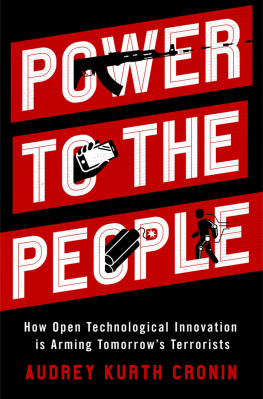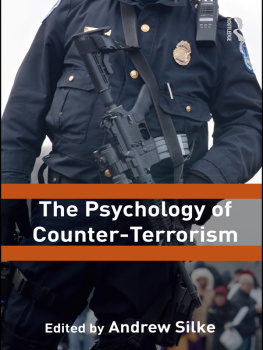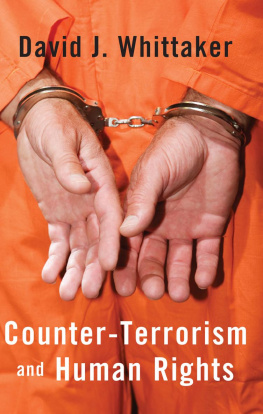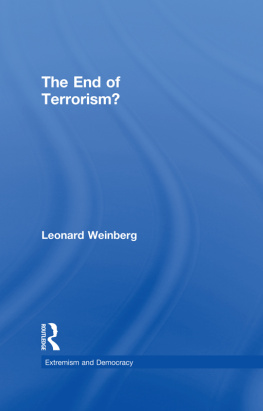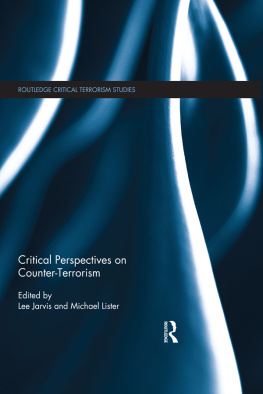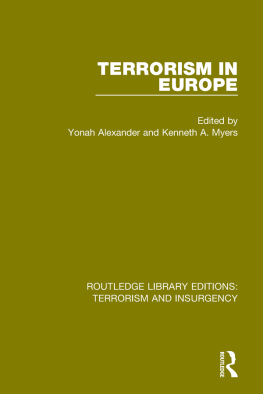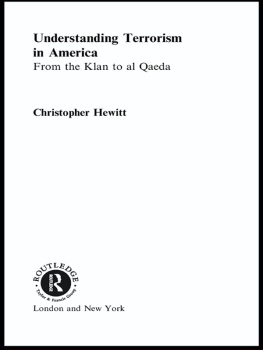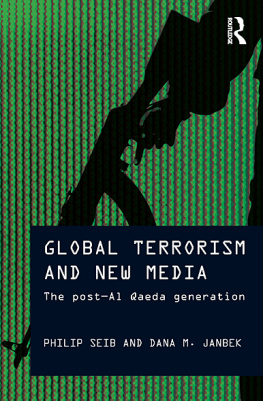ENDING TERRORISM
Lessons for defeating al-Qaeda
AUDREY KURTH CRONIN
ADELPHI PAPER 394
The International Institute for Strategic Studies
Arundel House | 1315 Arundel Street | Temple Place | London | WC2R 3DX | UK
ADELPHI PAPER 394
First published April 2008 by Routledge
2 Park Square, Milton Park, Abingdon, Oxon, OX14 4RN
for The International Institute for Strategic Studies
Arundel House, 1315 Arundel Street, Temple Place, London, WC2R 3DX, UK
www.iiss.org
Simultaneously published in the USA and Canada by Routledge
711 Third Avenue., New York, NY 10017
Routledge is an imprint of Taylor & Francis, an Informa Business
2008 The International Institute for Strategic Studies
DIRECTOR-GENERAL AND CHIEF EXECUTIVE John Chipman
EDITOR Tim Huxley
MANAGER FOR EDITORIAL SERVICES Ayse Abdullah
COPY EDITOR Matthew Foley
ASSISTANT EDITOR Katharine Fletcher
PRODUCTION John Buck
COVER IMAGE Getty
All rights reserved. No part of this book may be reprinted or reproduced or utilised in any form or by any electronic, mechanical, or other means, now known or hereafter invented, including photocopying and recording, or in any information storage or retrieval system, without permission in writing from the publishers.
British Library Cataloguing in Publication Data
A catalogue record for this book is available from the British Library
Library of Congress Cataloging in Publication Data
ISBN 978-0-415-45062-1
ISSN 0567-932X
Contents
Glossary
| ANC | African National Congress |
| EIJ | Egyptian al-Jihad |
| EPL | Popular Liberation Army (Colombia) |
| ETA | Basque Fatherland and Freedom |
| FARC | Revolutionary Armed Forces of Colombia |
| FLN | National Liberation Front (Algeria) |
| FLQ | Front de libration du Qubec |
| FPMR-D | Manuel Rodriquez Patriotic Front Dissidents (Chile) |
| GAI | Egyptian al-Gamaa al-Islamiyya |
| GIA | Armed Islamic Group (Algeria) |
| IRA | Irish Republican Army |
| LTTE | Liberation Tigers of Tamil Eelam (Sri Lanka) |
| M-19 | April 19 Movement (Colombia) |
| MILF | Moro Islamic Liberation Front (Philippines) |
| MIPT | Memorial Institute for the Prevention of Terrorism |
| MK | Umkhonto (military wing of the ANC) |
| NPA | New Peoples Army (Philippines) |
| PKK | Kurdistan Workers Party |
| PLO | Palestine Liberation Organisation |
| SA | Sturm-Abteilung |
| UDA | Ulster Defence Association |
| UVF | Ulster Volunteer Force |
| WMD | weapons of mass destruction |
Introduction
Focusing on how terrorism ends is the best way to avoid being manipulated by it. Terrorism has been most effective as a strategy of leverage that draws its power from state action, and when democratic governments acquiesce to it, it is almost impossible to win. The ideal way to avoid this trap is to understand how terrorist campaigns have actually ended, and then drive towards that goal. There is vast historical experience with the decline and ending of terrorist campaigns over the past two centuries, yet few policymakers are familiar with it. Instead, officials tend to respond (very humanly) to popular passions and anxiety in the aftermath of attacks, resulting in policy made primarily on tactical grounds, undermining their long-term interests. Fear is exactly what terrorism is designed to exploit. When leaders make decisions primarily on the basis of fear they are perpetuating the natural dynamic of terrorism.
All terrorist campaigns end. One way to nudge terrorist organisations towards their demise is to understand the closing phases of other organisations, carefully cull those experiences that apply to the current threat from those that do not, and act according to the lessons of relevant experience. While studying the history of terrorism is not sufficient to explain the threat the world now faces, it is necessary if we are to extricate ourselves from the counterproductive policies and narrow doctrinal disputes that are absorbing all of our energies.
Strategy is the art of distributing and applying military means to fulfil the ends of policy, yet thinking about the current struggle as a long war Likewise, the best way to meet the current threat is to look beyond the international terrorist campaign inspired by al-Qaeda, beyond the military strategy the West has devised to answer it, towards a broader vision of how it will end.
A universal strategy for ending terrorism is by definition impossible. Previous attempts to devise one have tended to focus on singular means, such as brute force or capitulation, arising out of assumptions about the ideological causes that groups pursue. But the long-term threat to security posed by groups that use extreme violence, such as the al-Qaeda network, demands creative responses. While there is no substitute for local knowledge and detailed expertise about specific organisations and cultures, failing to work across the seams of historical experience promotes parochialism and denies policymakers the cross-cutting concepts they need for countering terrorism.
We are learning to our peril that understanding war termination is at least as important as dissecting the causes of war. Likewise, processes of ending for terrorist groups hold within them the best insights into which strategies succeed and which fail, and why. Appreciating how terrorist campaigns actually end offers the chance to remove ourselves from the strategic myopia that currently grips much of Western counter-terrorism efforts.
There is much to be learned by studying the closing phases of other terrorist campaigns, and extracting common experiences and policy lessons from predecessors. Yet the wealth of historical experience with terrorisms termination is largely untapped. This Adelphi Paper posits five typical strategies of terrorism, and explains the particular challenges democracies face in responding to them.as in countless antecedents, understanding how terrorism ends is the best route to a broader view of the campaign, and to thinking that goes beyond the shorter-term strategies of terrorism.
Chapter One
The Strategies of Terrorism
Terrorisms strategic logic is to draw enough power from the nation-state so as to enable a weaker, non-state actor to accomplish its political aim. Yet that is not to say that state governments necessarily determine the success or failure of terrorist campaigns. There are a number of direct and indirect ways for non-state actors to derive power from the state, and some of them do not directly engage with the government at all. In fact, study of the closing phases of terrorist groups non-state entities that rely on violence against non-combatants demonstrates that, in some circumstances, factors internal to these groups are most salient. Policymakers often try to understand what works against terrorism by studying the counter-terrorist campaigns of states, but this is only part of the equation. The history of terrorism reveals that the reasons for a groups demise may have little to do with the measures taken against it.
The strategies of terrorism are best approached by examining the intersection between objective, target and audience, taking care not to omit any of these factors. More specifically, the three dimensions of study comprise the overall political aims of a group, the nature of the direct state target of that groups attacks and the character of the audiences influenced by the violence. Distinguishing among these three elements is not as simple as it appears, however, as their relative weight varies and each may contain multiple layers and complexities. Their composition is determined by the political, social and historical context from which a terrorist group springs, and is as unique as the group itself. Thus, generalisations about the strategies of terrorism, like those for more conventional types of conflict, are inherently suspect and subject to exceptions. As in war, there is no substitute for detailed research into the nature and character of individual adversaries. Nonetheless, terrorisms triad is equally vital to sound analysis.


